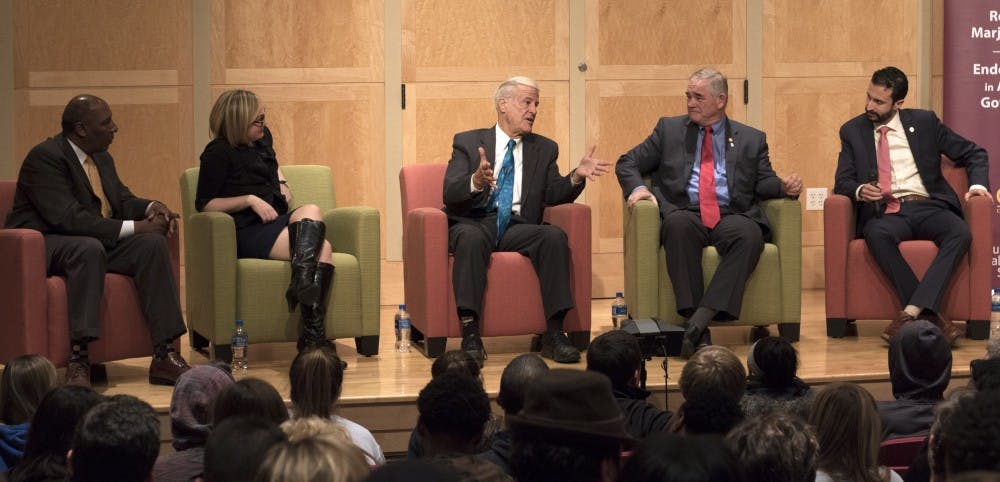Panelists discuss immigration, voting during Griffin Policy Forum
Sanctuary cities, voting tendencies and the border wall were just a few of the topics discussed at the Griffin Policy Forum.
Over 150 people packed into the Charles V. Park Library Auditorium Monday night to hear five panelists discuss borders, boundaries and migration. The forum was part of the College of Humanities and Behavioral and Social Sciences’ panel series: Critical Engagements: Questions that Matter.
The title of the forum was "Off the Record, On the Road: Borders, Boundaries and Migration."
The forum was moderated by state capital correspondent Tim Skubick. Skubick has won four Emmy’s for broadcast news work and currently hosts “Off the Record,” a political talk show on WKAR.
The panel included:
- Former state representative and state senator, Bill Ballenger. Ballenger produced a biweekly newsletter: “Inside Michigan Politics,” which ran for 27 years. He now produces “The Ballenger Report,” a free publication about Michigan politics.
- Zoe Clark, Michigan Radio’s program director. Clark oversees programming for Michigan Radio. She also co-hosts weekly radio show “It’s Just Politics” with Michigan Public Radio Network's Lansing Bureau Chief Rick Pluta.
- Chuck Stokes, editorial and public affairs director for WXYZ-TV. He is also the moderator and producer of “Spotlight on the News,” Michigan’s longest-running weekly news and public affairs show.
- Republican Rep. Edward Canfield, currently serving the 84th District in the Michigan House of Representatives.
- Rep. Yousef Rabhi, D-Ann Arbor, who is serving his first term for the 53rd District in the Michigan House of Representatives.
Skubick opened discussion with mention of the border wall, which prompted debate about immigration policy. Rabhi explained why the border wall gained support among voters during the 2016 election.
“I think it was driven by some fear, I think it was driven by elements of nationalism,” Rabhi said.
Canfield shared his opinion about illegal immigration. He mentioned that it takes an average of five to 12 years for someone to immigrate to the U.S. legally, and he believes illegal immigrants are not waiting for their turn.
“I think that people who walk across a porous border, have kind of usurped the process," Canfield said. That’s one of the things people have a problem with.”
Sanctuary cities were also discussed during the forum. Sanctuary cities, like Detroit and Ann Arbor, prohibit police from checking the immigration status of people who aren’t suspected of crime. Opponents believe local police should help enforce federal immigration laws, while supporters believe local police should use their resources for local crimes.
“I find it a little ludicrous that someone can commit a crime in our nation and not be a legal immigrant, and not have that be part of the discussion,” Canfield said. “I would suggest if someone is incarcerated, we should know: are they here legally or illegally?”
Audience member Alma senior Jackie Smith said she supports the idea of sanctuary cities.
“I don’t think the federal government should be able to tell local police agencies what they should be doing, so I think sanctuary cities are a great way to combat that,” Smith said. “I feel like it’s infringing on the value of police officers and what they do. They are supposed to keep people safe, I don’t think that should be determined by their immigration status.”
Rabhi brought up the issues arising with terminology in the immigration debate.
“No human being is illegal,” Rabhi said. “We can talk about undocumented immigrants, but we should not be talking about illegal immigrants. We are all human, no matter what country we are from.”
The conversation shifted to the gubernatorial race and what voters look for in a candidate. Audience members got involved in a debate about whether experience or inspiration is more important when deciding who to vote for. The panelists agreed the best politicians are both experienced and inspirational.
Stokes said a charismatic, inspirational politician tends to be more successful.
“I think the voters want to be inspired,” Stokes said. “We saw it with Donald Trump, we saw it with Barack Obama, we saw it with Jennifer Granholm and we saw it with Rick Snyder as well. They’re not looking for traditional political experience.”
Clark agreed with that statement, adding the idea if a politician is more appealing, they will be more successful.
“The (politician) that gets the most attention tends to be charismatic, exuberant and let’s be clear too, it doesn’t hurt to be good looking,” Clark said. “Americans like to vote for people that they like. Americans, most of us, want to feel like we’re buddy-buddy. We want to feel like they’re a regular person.”
Clio senior Mackenzie Flynn disagreed with this based on information she learned in one of her classes about the difference between a public servant and a politician.
“A public servant is there to vote in the name of their people and represent their respective area. A politician is there to be liked and make good commercials," Flynn said. "I think if you vote for someone who is purely inspirational, you’re going to get good actors, or really good at selling things, but that doesn’t mean you should trust them.”
The conversation ended with a discussion about political polarization. All the panelists agreed there is a divide in politics that is getting deeper. They discussed ways to combat the division by staying informed, thinking critically and being open to hearing disagreeing opinions.
“There is a basic set of facts we all believe we can agree on about anything in life,” Clark said. “Whether it be climate change, whether it be the number of undocumented immigrants in the country, we’ve got to get back to a conversation where we can at least agree there are some basic truths instead of letting fake news organizations tell us different.”




